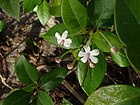Note: This is a project under development. The articles on this wiki are just being initiated and broadly incomplete. You can Help creating new pages.
Clerodendrum inerme
This plant is belings to Verbenaceae family.[1]
Uses
Parts Used
[[:Category:Herbs with used in medicine|]], stem.
Chemical Composition
Clerodendrum inerme contained cardiac glycosides, anthraquinones, proteins, phenolics, flavonoids, saponins, tannins, iridoids, diterpenes, triterpenes, sterols, steroids, carbohydrates, fixed oils, volatile oils and lignin.[3]
Common names
| Language | Common name |
|---|---|
| Kannada | ನಾಯಿತೆಕ್ಕಿಲೆ Naitekkile, Itteru, ಕುಂಡಲಿ ಗಿಡ |
| Hindi | Chhoti-ari |
| Malayalam | Nirnochi |
| Tamil | Sangam |
| Telugu | Erup-pichha |
| Marathi | Sangam |
| Gujarathi | |
| Punjabi | |
| Kashmiri | |
| Sanskrit | Kundali |
| English | Glory Bower, Indian privet |
Properties
Reference: Dravya - Substance, Rasa - Taste, Guna - Qualities, Veerya - Potency, Vipaka - Post-digesion effect, Karma - Pharmacological activity, Prabhava - Therepeutics.
Dravya
Rasa
Guna
Veerya
Vipaka
Karma
Prabhava
Habit
Identification
Leaf
| Kind | Shape | Feature |
|---|---|---|
Flower
| Type | Size | Color and composition | Stamen | More information |
|---|---|---|---|---|
| {{{5}}} |
Fruit
| Type | Size | Mass | Appearance | Seeds | More information |
|---|---|---|---|---|---|
Other features
List of Ayurvedic medicine in which the herb is used
Where to get the saplings
Mode of Propagation
[[:Category:Index of Plants which can be propagated by |]]
How to plant/cultivate
Commonly seen growing in areas
[[:Category:Herbs that are commonly seen in the region of |]], [[:Category:Herbs that are commonly seen in the region of |]], [[:Category:Herbs that are commonly seen in the region of |]], [[:Category:Herbs that are commonly seen in the region of |]], [[:Category:Herbs that are commonly seen in the region of |]].
Photo Gallery
References
- ↑ Karnataka Aushadhiya Sasyagalu By Dr.Maagadi R Gurudeva, Page no:323
- ↑ Indian Medicinal Plants by C.P.Khare
- ↑ Chemical constituents
- ↑ Local names
- ↑ [Morphology]
- ↑ [Cultivation]
External Links
- Ayurvedic Herbs known to be helpful to treat Eye infection
- Ayurvedic Herbs known to be helpful to treat Fever
- Ayurvedic Herbs known to be helpful to treat Headache
- Ayurvedic Herbs known to be helpful to treat Skin rashes
- Herbs with used in medicine
- Herbs with stem used in medicine
- Herbs with common name in Kannada
- Herbs with common name in Hindi
- Herbs with common name in Malayalam
- Herbs with common name in Tamil
- Herbs with common name in Telugu
- Herbs with common name in Marathi
- Herbs with common name in Sanskrit
- Herbs with common name in English
- Habit - A straggling branched shrub
- Index of Plants which can be propagated by
- Herbs that are commonly seen in the region of
- Herbs
- Pages without herbs images



